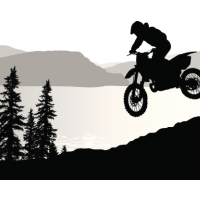52-Year Federal Protection of U.S. Wilderness from Mountain Bikers Targeted by Republican Bill
 (graphic: Getty Images)
(graphic: Getty Images)
By Michelle L. Price, Associated Press
SALT LAKE CITY (AP) — More than 100 million acres of America's most rugged landscapes designated as wilderness are off-limits to mountain bikers, but two Utah senators have introduced legislation that would allow bikers to join hikers and horseback riders in those scenic, undisturbed areas.
The proposal is controversial within the biking community and opposed by conservationists who say bikes would erode trails and upset the five-decade notion of wilderness as primitive spaces.
The bill (pdf) from U.S. Sens. Mike Lee and Orrin Hatch, both Utah Republicans, would give local officials with the Bureau of Land Management, U.S. Forest Service and other federal management agencies two years to decide in each wilderness area if bikes will be allowed. If no decision is made within two years, the bike ban would be lifted in that area.
The legislation, which has not yet had a hearing, comes from somewhat unlikely sponsors. Hatch and Lee both represent Utah, where outdoor recreation and mountain biking are big business, but are supporters of the GOP state's push to takeover public lands controlled by the federal government — something environmentalists and outdoor recreation groups oppose.
Lee, who said he's a former mountain biker, said his bill takes on what he sees as another overreaching federal regulation that hamstrings locals and that there's no evidence that mountain bike tires cause any more erosion than hikers do.
At issue is a part of the 1964 Wilderness Act (pdf) restricting the use of "mechanical transport" — bikes, all-terrain vehicles and cars — in those 100-plus million wilderness acres in 44 states. It's the only blanket ban on bicycling in the federal public lands system.
The ban on "mechanical transport" doesn't include wheelchairs, which are allowed as part of the Americans with Disabilities Act, and Lee notes that skis, rock climbing gear, kayaks, which are also allowed, "arguably involve some type of mechanical action" and help people move about.
While mountain biking wasn't a popular sport when the law was passed, they will alter the character of those spaces and are tough on trails, said Alan Rowsome with The Wilderness Society, a Washington, D.C.-based conservation group.
Rowsome said that only about 10 to 12 percent of all U.S. public lands are protected under the Wilderness Act, one of "the bedrock environmental laws we have in this country" setting aside some areas as sacrosanct.
That includes tens of thousands of acres of forests, valleys, lakes and peaks around Lake Tahoe, that "if mountain bikers could start riding those trails, they would be in Seventh Heaven," said Ted Stroll, president of the Sustainable Trails Coalition, a nonprofit that's working to overturn the ban.
Stroll said the wilderness ban on bikes leaves riders in Colorado on dirt forest roads from Crested Butte to Aspen instead of more scenic single track trails. In North Dakota, he said, about 100 miles of one bike trail are bookended by wilderness zones, leaving bikers to make detours at both ends to avoid the protected areas.
The International Mountain Bicycling Association doesn't have a position on the bill and is still reviewing it, according to president Mike Van Abel, but the association's 40,000 mountain bikers are divided on the idea.
Some mountain bikers don't want to upset longstanding political alliances with conservation groups and say bikers should instead focus on working with interest groups and lawmakers to negotiate and move the boundaries of wilderness areas to allow bikes on trails.
"Wilderness is the first time we as a species decided to put the needs of nature above the needs of man," said Ashley Korenblat, the owner of a bicycling tour company based in the mountain bike Moab, Utah, a red rock mountain biking playground. "We don't need to ride our bikes everywhere."
Korenblat, a former chair of the International Mountain Bicycling Association, said there are few trails in wilderness areas that would be fun to ride, but "the last thing the bike industry wants to do is have a big fight with the environmental community."
To Learn More:
Senate Bill 3205: Human-Powered Travel in Wilderness Areas Act (Sens. Mike Lee and Orrin Hatch, U.S. Senate) (pdf)
Divided Federal Court Rules Agriculture Dept. Improperly Exempted Nation’s Largest National Forest from Roadless Rule (by Steve Straehley, AllGov)
Obama Administration Approves Logging in Roadless Area (by Noel Brinkerhoff, AllGov)
- Top Stories
- Unusual News
- Where is the Money Going?
- Controversies
- U.S. and the World
- Appointments and Resignations
- Latest News
- Trump to Stop Deportations If…
- Trump Denounces World Series
- What If China Invaded the United States?
- Donald Trump Has a Mental Health Problem and It Has a Name
- Trump Goes on Renaming Frenzy






Comments